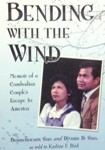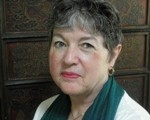A Cambodian family escapes the Killing Fields as told to Karline F. Bird (Thailand 1968-70)
 Bending with the Wind:
Bending with the Wind:Memoir of a Cambodian Couple’s Escape to America
by Bounchoeurn Sao and Diyana D. Sao
(as told to Karline F. Bird (Thailand 1968-70)
McFarland & Company, Inc. $35.00
210 pages
2012
Reviewed by Collin Tong (Thailand 1968-69)
With the fall of Phnom Penh on April 20, 1975 and the ascendancy of the Khmer Rouge came the closing of Cambodia’s border and a cataclysmic reorganization of Cambodian society. As documented in previous histories and first-person accounts, the Cambodian nightmare led to the wave of terror marked by torture and the extermination of intelligentsia. More than two million people, a quarter of the population, perished in the Killing Fields.
In 1970, the United States and South Vietnamese forces invaded eastern Cambodia, driving the North Vietnamese army further west. A young Cambodian double agent working for American and Cambodian Special Forces, Bounchoeurn Sao, was stationed near the Cambodian and Lao border. Eventually, he and his wife Kim and children moved to Battambang province.
The Khmer Rouge, under its leader Pol Pot, began its systematic indoctrination of Cambodian citizens. Because Bounchoeurn was sent to Phnom Penh shortly before the Khmer Rouge takeover, he became separated from his family. Along with millions of others, Bounchoeurn and his in-laws were evacuated from Phnom Penh on foot.They eventually travelled by boat to Takhmau across the Bassac River, and Bounchoeurn finally arrived in his birth village in Takeo province. A former Buddhist monk, now Khmer Rouge officer, saved Bounchoeurn’s life by giving him refuge in a Buddhist temple, Wat Chambak.
In January 1976, Bounchoeurn succeeded in reaching the Thai border with two companions, eventually arriving at a refugee camp in Surin, Thailand after working for almost a year at slave labor. After searching for two years for his wife and children, Bounchoeurn met San Bounriem [her married name became Diyana D. Sao] in the same camp. Bounriem had fled from the Khmer Rouge in a different part of Cambodia. They eventually married and found their way to Washington State as part of a wave of refugees in the late-seventies.
Bounchoeurn and Diyana D. Sao’s harrowing odyssey from their rural villages and escape from Cambodia to the refugee camps of Thailand, and eventually America, is the subject of Karline Bird’s absorbing new book, Bending With the Wind: Memoir of a Cambodian Couple’s Escape to America. Bird and her husband, Rick, both returned Peace Corps Volunteers [Thailand 1968-1970], first met the couple in the fall of 1979.
Rick Bird hired Bounchoeurn as an educational assistant and translator for the Olympia School District, in Olympia, Washington, where he directed the district’s English as a Second Language program. Faced with the large influx of Southeast Asian refugees in Washington State following the fall of Saigon and Phnom Penh in 1975, the district needed someone who could speak Cambodian, Lao, and English to work with refugee students.
Karline Bird, an English teacher in the district, became intrigued by Bounchoeurn’s family history and her Cambodian students’ memories of their wartime experiences. After retiring in 2006, Bird and Bounchoeurn agreed to collaborate on a book about his family’s journey from the Killing Fields and began logging more than 30 hours of interviews over the next three years.
Following the completion of their project, the Birds traveled to Cambodia in 2009 to meet Bounchoeurn’s extended family in Takeo and friends in Banteay Meanchey. They also retraced the route of Bounchoeurn’s escape from Phnom Penh to the Thai border. Karline Bird’s richly-detailed book contains an equally absorbing account of San Bounriem’s story.
While excellent accounts of modern Cambodia’s tragic history are available, most notably Elizabeth Becker’s After the War was Over, Ben Kiernan’s The Pol Pot Regime, and David Chandler’s A History of Cambodia, books about the experience of Cambodian refugees in the United States, by comparison, are relatively sparse. Of those books, former Peace Corps Volunteer Sarah Streed’s Leaving the House of Ghosts: Cambodian Refugees in the Midwest, and Karline Bird’s Bending with the Wind, are the most authoritative and indispensable.
Bird has begun work on her next book, the memoir of a Chinese woman’s life as a Red Guard.

Karline F. Bird
Collin Tong (Thailand 1968-69) is a Seattle freelance journalist and contributing writer for Crosscut News [Crosscut.com]
No comments yet.
Add your comment